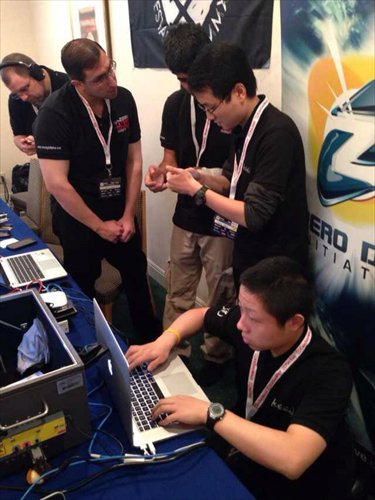

Fang Jiahong (working on the keyboard) and other participants at this year's Mobile Pwn2Own contest Photo: Courtesy of Keen Team
This month, three professional hackers from Shanghai became the first to break into Apple's latest iOS7.0.3 system. They did this in just 30 seconds at this year's Mobile Pwn2Own contest, an event sponsored by the TippingPoint's DVLabs, the information security service provider for the Pentagon. This year the contest was staged in Tokyo on November 13 and 14. The three professionals from the Shanghai Keen Team became the first Chinese to win this international contest since it was launched in 2007. It had only been 21 days since Apple had released this system.
Although it took the three-member team just 30 seconds to hack into the system, a great deal of preliminary work had been done beforehand at the Shanghai office where all the Keen Team including their top eight hackers were involved.
Over the 20 days and nights of preparation, team leader Wang Qi, and his colleagues located a flaw which they were confident Apple had not yet discovered. If Apple had known about it and repaired it their work would have been wasted.
Hackers not crackers
Most people think of hackers as they are generally portrayed by the media - as greedy criminals or outlaws who break into computer networks or systems to steal information or money or cause damage.
Wang Qi is the 35-year-old Keen Team CEO and team captain for the Mobile Pwn2Own 2013 contest. "Most people mistake the word hackers for the word crackers - we hackers wear white hats and crackers have black hats."
"Most Chinese think hackers are Internet thieves," said team member 29-year-old Fang Jiahong. "The definition of crackers on the Pwn2Own's website as 'script kiddies' is a perfect definition," Wang Qi explained. Although a 7-year-old child might be able to use someone else's program and hack into a website and cause damage he or she would not be able to do any more. "That is exactly what a script kiddie is."
The real purpose of the hacking contest is to show up vulnerabilities and flaws in a system's security. Security for modern complex systems is often better being checked by outside experts who have not been involved in their development. When they discover flaws or problems they inform the designers who can modify and patch their software.
Team member Fang Jiahong is a real whizz kid - he has been involved in computer programming since he was 6 when his father began teaching him how to program. He won a stack of prizes in computer programming competitions while at school and qualified as a system analyst when he was 18. After he graduated from the prestigious No.2 High School of East China Normal University, he was enrolled in China's first information security major degree course at Shanghai Jiao Tong University and, after graduating, joined Microsoft.
Outstanding qualifications
"All of our team have outstanding qualifications in computer science and programming. We are the ones who can bypass security programs miles and miles away from the system. We can make the keys that fit the locks on the systems, but then we hand these keys over to the system owners so that they can patch and upgrade their systems. Most black hats just use methods and keys designed by someone else to infiltrate and steal. It's easy to be a cracker, but very hard to be a hacker," Wang Qi said.
Hackers need a lot more than just a good education and sometimes even that is not a prerequisite. Another professional hacker Luo Qinglan was not top of the class in all his subjects at high school but his programming skills garnered him several major prizes in IT contests and this saw him being admitted to Shanghai's Donghua University without having to pass the gaokao, the national college entrance examinations. If he had had to pass the gaokao, his low marks in other subjects would probably have precluded Luo from being able to join a graduate course at a major university.
He was inspired to adopt a career in hacking when he was a primary school student playing online games on his musician and writer father's computer. When the computer broke down constantly his irate father asked professionals to fix it. At that stage the 11-year-old Luo began his own research and discovered that the computer had been hacked by someone who had been playing online games with him. He solved the problem by installing a firewall and this spurred his interest in hacking.
By visiting the online forums and chat rooms where China's early hackers communicated and discussed techniques, Luo became a skilled hacker. As a teenager eager to prove himself he occasionally hacked into major websites but then he saw other young hackers being caught and sentenced to prison for similar practices so he rethought his career.
Copyright ©1999-2018
Chinanews.com. All rights reserved.
Reproduction in whole or in part without permission is prohibited.